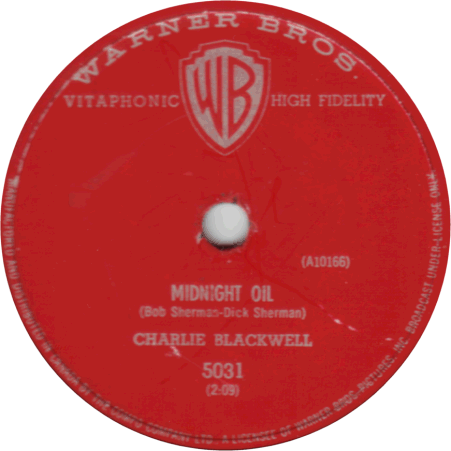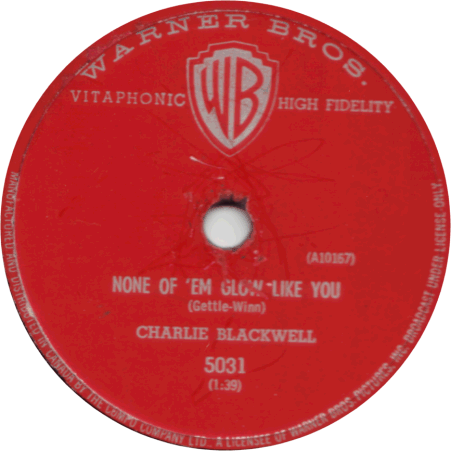
The Beatles
at 78 RPM
|
Cool 78 of the Month March 2009 |
|
Charlie Blackwell Midnight Oil Warner Brothers 5031 (Canada) 1959 |

|
|
As the artist of this month's Cool 78, Charlie Blackwell is a bit of a mystery. It seems easier to confirm anecdotes that aren't true about him or the sessions for this release, than it is to say much else. So, here's what we do know. He is not the same Charles Blackwell who did many of the arrangements on recordings produced by Joe Meek in the 60s. We also know that there is no truth to the rumour that Eddie Cochran played on this recording. We do know that Midnight Oil went as high as number 55 in the US charts in February/ March of 1959. It didn't seem to chart anywhere else though. Sources such as Joel Whitburn say that he was born in Seattle on May 11, 1921 and played drums with musicians such as Stan Kenton and Dave Brubeck. This last part seem to fit because Midnight Oil is a nifty little instrumental featuring only drums, piano, and a whistler. It was written by the team of the Sherman Brothers, Bob and Dick, who are best known for their musical contributions to some of Disney studios classics such as Mary Poppins, The Jungle Book, and Winnie the Pooh. The b-side, None of 'em Glow Like You, is a catchy vocal track. Both tracks show up quite often on lists of lost oldies. The US release was 45 rpm only, as Warner Brothers records had no releases on 78 there at that time. In Canada however, WB released both 45s and 78s (in Vitaphonic High Fidelity no less!), well into 1959, with the two biggest being 77 Sunset Strip by The Big Sound of Don Ralke on WB 5077, and Kookie, Kookie (Lend Me Your Comb) by Edward Byrnes and Connie Stevens on WB 5047. Both were based on the Warner Brothers produced TV Series 77 Sunset Strip. In the UK and South Africa, WB released 78s into 1960, the releases by the Everly Brothers being the most highly sought after. Of special interest, though is the fact that WB remains one of the most prolific labels in terms of releases on 78 after the 78 was considered obsolete. Most people think that Warner Brothers didn't enter the record business until 1958. This is only partially true. While there was no Warner Brothers label records until 1958, in 1930 Warner Brothers Studios bought the Brunswick label from its founder, the Brunswick-Balke-Collender company of Dubuque Iowa. Brunswick-Balke-Collender was best known for its pianos and sporting equipment. Warner Brothers was best known for its films and its success with The Jazz Singer, a film that brought sound to the movies. Warners knew that with a record label they could tap their talent base and not only have hit films but also hit records with songs from their musicals. It was too bad that the economic crisis of the 1930s meant that people didn't have the money to spend on records, so the studio entered into a business arrangement with the American Record Corporation for Brunswick to be operated by ARC as a budget priced label. This worked well for all parties and soon WB was able to buy interest in the American operations of Decca. At the end of the decade, ARC was sold to the Columbia Broadcasting System (CBS), who promptly shut it, and Brunswick, down. After all, they had their own label, Columbia, to run. As a result of this, the Brunswick trademark was passed on to the US Decca label, nominally putting WB back in the record business, at least for a while. WB was a movie studio however, and really had no interest in the record business. They were so out of touch with that part of the entertainment world that they didn't negotiate music recording deals into the contracts with any of their talent. This meant that Tab Hunter, an actor who was under contract to them for films, was free to record music anywhere he chose. Even though Tab felt that he couldn't sing, Randy Wood at Dot records signed him up and had him record Young Love, hitting the charts in 1957. Two things emerged from this. First was the fact that Tab was right about singing ability. The second was that if Randy Wood could make money off a guy who couldn't sing, especially when it was one of their guys, then WB ought to get back into that business! Warner Brothers became a record label of its own, joining its peers such United Artists and MGM, in 1958. They didn't stick to only artists under contract the studio, but rather released anything and everything, except teenage rock and pop. This, of course meant nothing to the charts. Then in 1959 that changed, and Warners began its climb out of the doldrums, eventually becoming an entertainment conglomerate. Over the course of its history, it would sign some of the biggest artists of all time. Warner's original label, Brunswick, would be revived in the 50s under Decca as home to artists like Buddy Holly and Jackie Wilson. It would soon leave that fold, though, and live on as an independent label, although its landmark records from its heyday would remain with Decca, a label that eventually found itself linked for a time with a WB competitor, Universal Studios. In Canada, Warner Brothers Records would be manufactured and distributed by the Compo Company of Lachine in Quebec, the same company that manufactured and distributed records from US Decca, and as such, Brunswick, in Canada. As to its involvement with our friend the 78, Warners would too, drop the format for regular releases. However as we saw in January with a stereo 78 by Leon Redbone in the 1970s, and will see in upcoming months as we explore 78s by Tiny Tim in 60s and Randy Newman in the 70s, Warners had a hard time saying 'That's all Folks' to the 78. You might ask, what does WB's history as a record company have to do with our Cool 78 of the month. The only answer I can give is that the accountants must have burned a lot of midnight oil to arrange the complex deals that saw the film studio leap in and out of the record business and around Brunswick-Balke-Collender to ARC to Decca to Columbia, as it did over the course of that history. |
|
B Side Charlie Blackwell None of 'em Glow Like You |

|
